
Alphabetical Menu
Chronological Menu
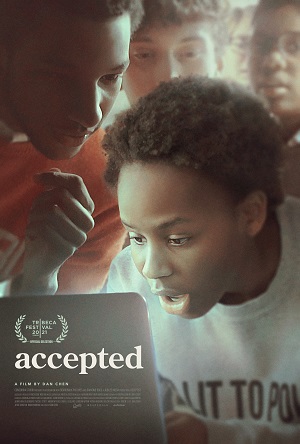
Accepted is an engrossing documentary about a scandal involving T.M. Landry Preparatory School in Louisiana after an exposé in the New York Times. Directed by Dan Chen doesn't begin with the scandal right away. He initially shows footage from the school prior to the scandal and presents facts that make the school sound like a dream come true: 100% of the students have been accepted into colleges with 30% of them accepted into Ivy League schools. The school teaches its students without homework or even textbooks. Most of the students are minorities and come from low-income families. The school's founder, Mike Landry, talks to the students as though he were an army general. He's tough, stubborn and very demanding of his students. As the saying goes, if it sounds too good to be true, it most likely is. The first half of Accepted is essentially the quiet before the storm. Once the scandal hits about how the school committed transcript fraud and emotionally abused its students. The students are children, so Mike Landry and the adults who enabled him are child abusers who prey on the vulnerable while crossing legal, ethical and moral boundaries. He's unrepentant, though. Accepted doesn't focus too much on Mike Landry, although it doesn't show his side of the story, too. It mostly documents how the scandal affected the victims: the students whose livelihoods were affected by the scandal. Whether you're a parent or a child, this doc will compel you to think about the systemic issues in the education system, like racism and classism, that's part of the root causes of T.M. Landry's transcript fraud. If only Mike Landry were mature enough to realize that two wrongs don't make a right and that when you spit in the air, it lands on your face. He's a terrible role model, even more so for lacking the decency to acknowledge the consequences of his actions. Hopefully, the students have learned a hard lesson that even adults who you're supposed to trust can be weak, unreliable and immature scoundrels. At a running time of 1 hour and 31 minutes, Accepted is heartfelt, enraging and provocative. It opens at Quad Cinema via Greenwich Entertainment and would make a good double feature with Quiz Show.. 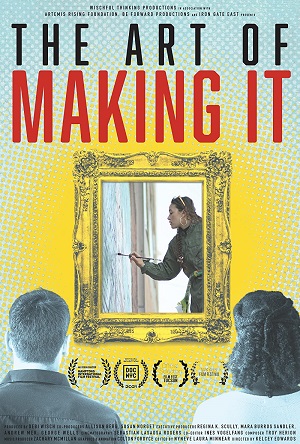
The Art of Making It, sheds light on the broken system of the art world. Artists pay thousands of dollars to get into art school and end up saddled with debts that they struggle to pay off. A teacher at one of the arts schools quit teaching because she didn't want to waste her students' time and wanted to make better use of their time by giving them real-world experience as they help her with art projects. Director Kelcey Edwards examines the systemic issues of the art world thoroughly by including interviews with art critics, academics, museum curators, art collectors and struggling artists. That allows The Art of Making It to be The doc begins like an essay by introducing you to the many questions and concepts that it will be exploring throughout the film. That's a great way to start the film, but it's also a tall order to fill given all the questions that it poses. Chris Watts, of the artists profiled in the doc struggles to make ends meet while working three jobs as a bartender while finding spare time to work on his art projects. Other artists also profiled include Jenna Gribbon, Gisela McDaniel and Sebastian ErraZuriza all of whom provide candid insights about their experiences in the art world. Ultimately, The Art of Making It bites off slightlt more than it could chew as it deals with the many complex, systemic issues of the art world. At least it gives audiences a lot to chew on, though. For example, there's just a little bit of time spent on the fact the arts are underfunded by the government. That's an important topic that could be easily explored in a completely separate documentary. At a running time of 1 hour and 34 minutes, The Art of Making It is a fair and balanced exposé as well as a powerful wake-up call for a systemically broken system that's in desperate need of significant repair. It opens at IFC Center on Wednesday, June 29th, 2022. 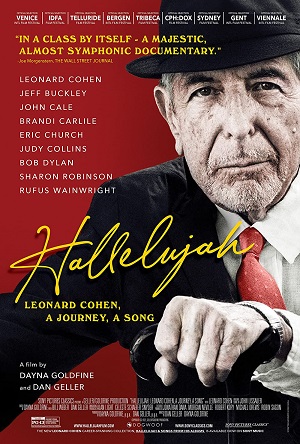 Hallelujah: Leonard Cohen, a Journey, a Song is an exhilarating and insightful documentary biopic about Leonard Cohen and his song "Hallelujah." Co-directors Daniel Geller and Dayna Goldfine combine archival concert footage, archival interviews with Leonard Cohem, audio recordings of interviews, and contemporary interviews with musicians and record producers. You'll even see interviews with Leonard Cohen rabbi, Mordecai Finely. The documentary charts Cohen's life chronologically from his childhood to his rise to fame, his fall from fame and then his comeback until his death. They don't shy away from including some of his emotional struggles as well as financial struggles, i.e. when his $5,000,000 pension was pilfered later in his life. Geller and Goldfine capture Cohen's palpable charisma. In the archival interviews, he seems bright and very zen---not surprisingly, he joined a Zen Buddhist monastery in 1994. Even at the monastery, he still managed to write songs. His good friend and collaborator, Judy Collins, makes a list of adjectives that describe precisely what made him stand out to her. One of those adjectives she lists is that he's mysterious which is a very perceptive observation. As an interviewee wisely admits, the song "Hallelujah" is open to interpretation. What makes it so special is that Leonard Cohen used a word, hallelujah, that usually has religious connotations, and brought it back down to Earth for the masses. Other musicians, i.e. Jeff Buckley, sang their own version of the song. Shrek used the song, too, but omitted the lyrics that aren't meant for kids to hear. Cohen does get asked at one point to comment on all of the different versions of his song from different music artists. His answer won't be spoiled here, though. Perhaps the most profound statement comes from someone who says that it's an insult to the artist to ask him or her to explain his art. He makes a good point albeit it's a harsh truth that's a lot to process. When it comes down to it, Leonard Cohen's songs speak for themselves. They're transcendant beyond words. The same can be said about Cohen's charisma. Hallelujah: Leonard Cohen, a Journey, a Song provides a glimpse into Loenard Cohen's heart, mind and soul. It opens at Film Forum on July 1st, 2022 via Sony Pictures Classics. The Forgiven 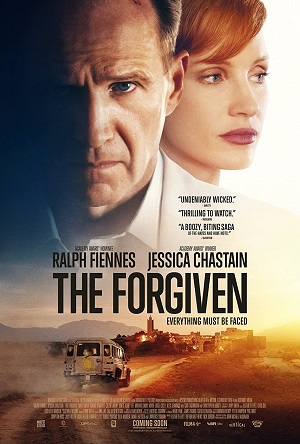 David Henniger (Ralph Fiennes) travels with his wife, Jo (Jessica Chastain), to Morocco to attend a costume party at the desert villa of his friends, Richard (Matt Smith). They rent a car, David gets drunk, and yet Jo still lets him drive down the only desert road leading to the villa. On the way there, David accidentally hits a Moroccon boy, Driss (Omar Ghazaoui), with his car and kills him while leaving the scene of the crime. Arriving late at the party, David tries to cover up the crime, but his predicament gets more complicated when Abdellah (Ismael Kanater), Driss' father, shows up demanding to come with him to bury his son's body. Meanwhile, Jo flirts with one of the party guests, Tom (Christopher Abbott).
Based on the novel by Lawrence Osborne, the screenplay by writer/director John Michael McDonagh wastes no time by jumping right into the moment when David and Jo arrive by boat to Morocco before driving to the villa. The audience learns right away that David and Jo's marriage has gone stale. You can sense that just by the way that they speak to each other. If this were a screwball comedy, you'd think they were in love like how the leads bicker in Bringing Up Baby. The Forgiven is no screwball comedy, though, nor does it try to be. It's partially a psychological crime thriller with some dark comedy thrown in. The accident, which becomes a serious crime after David and Jo flee the scene, occurs within the first ten minutes and serves as a catalyst for the events that unfold afterward. David and Jo come across as people who lack morals and the concept of boundaries, empathy and remorse. There's nothing wrong with having unlikable characters as long as they're interesting, complex and human. Unfortunately, the screenplay doesn't do an adequate job of getting inside these characters' heads; it seems more concerned about moving the plot forward or to move on to the next witty, biting quip. There's not enough dark comedy to make this a fun, guilty pleasure. Either the screenplay should've kicked up the level of bonkers and comedy up a few notches like in In Bruges or Very Bad Things or it should've taken itself more seriously and delved deeper into David and Jo's psyche. The Forgiven also doesn't have anything revealing or insightful to say about marriage, and it's not even remotely shocking that Jo has an affair with her husband with someone at the party. The biggest risk that it takes that makes it unconventional, dark and surprising as well somewhat Shakespearean, occurs during the last minute, but the journey to that moment is a long and somewhat dull experience. The Forgiven is very lucky to have Ralph Fiennes and Jessica Chastain because their charisma and moving performances help to invigorate the film while adding a little but of emotional depth that the screenplay itself lacks. Charisma alone can sometimes elevate the material which is the case here. Otherwise, The Forgiven would've been an anemic slog to get through. There are too many characters, and not enough of a perspective on the more likable ones, Driss and his father, Abdellah, which makes the film feel a bit limited in scope and black-and-white. When seeing Ralph Fiennes in a desert setting, it's hard to resist the temptation to think about him in a much more sweeping, exhilarating and engrossing film, The English Patient, also based on a novel. Even the desert scenes in that Best Picture-winner are more visually stunning than the desert scenes in The Forgiven. Despite that there's some dark comedy, there's nothing too bloody or gory or even physically gritty. Lack of physical grit is fine as long as there's emotional grit, but there's barely any of that to be found here either. At a running time of just under 2 hours, The Forgiven is meandering and somewhat dull, but that's easily forgiven for thanks to the heartfelt performances and palpable charisma of Ralph Fiennes and Jessica Chastain.
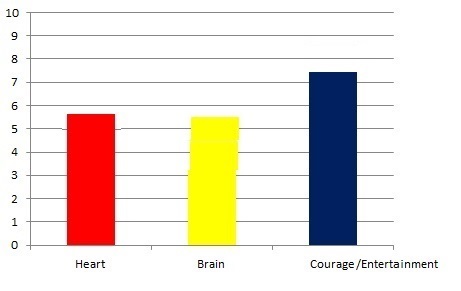 Fourth of July 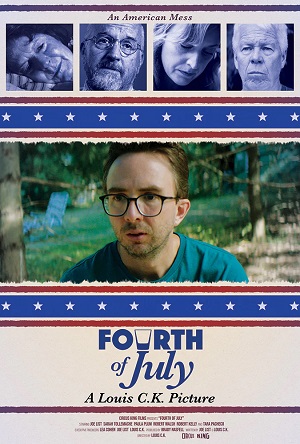 Jeff (Joe List), a recovering alcoholic, lives in New York City with his unhappy wife, Beth (Sarah Tollemache), while seeing a therapist (Louis C.K.). He finds Bobby (Robert Kelly), a fellow AA patient, to sponsor, before driving to the home of his toxic mother (Paula Plum) and father (Robert Walsh) in Maine to spend the 4th of July with them without his wife. Also joining the festivities are his uncles, Mark (Chris Walsh) and Kevin (Nick Di Paolo), his grandpa (Richard O'Rourke), and Naomi (Tara Pacheco) among others.
Fourth of July treads the same waters as On Golden Pond and, even more so, Ordinary People. The screenplay by writer/director Louis C.K. and co-writer Joe List feels more like an oversimplified and lighter version of those two classic films. It bites off a lot more than it could chew. Jeff has a rocky relationship with not only his family, but also with his wife who's not content with their relationship. Jeff's mother is a narcissist from the very beginning, and it's clear that she's emotionally abusive to him from the minute he enters her home just by the way she reacts when he tells her that he didn't bring his wife along with him. His other family members emotionally abuse him too while getting drunk. Then there's his father who remains quiet while enabling his mother. You can sense that he has something to say to Jeff and to his own wife, but he seems scared to speak out against her tyranny. He's probably abused by her as much as Jeff had been for years. There's no doubt that Jeff's mother and father did a lot of emotional and psychological damage to their son, but they don't seem like the kind of people who will ever really change. Jeff's mother doesn't acknowledge her actions nor the consequences of her actions. She tries to victim blame her own beloved son. The most emotionally mature character among everyone is Naomi who's a friend of the family. She recently lost her husband, although the screenplay doesn't really delve into her grief much. She doesn't even seem like someone who's grieving most of the time. Like Conrad's father in Ordinary People, Jeff's father has a brief scene where he tries to confront his wife about her toxic behavior. The scene doesn't hit as hard emotionally as it does in Ordinary People, but you do get a general sense that her husband isn't too happy with their marriage. < Unfortunately, the third act feels too rushed, sugar-coated, dishonest and doesn't earn its uplift because non one, even Jeff, has any believable character arcs. Jeff speaks up to his mother like Conrad does in Ordinary People , but nothing really changes afterward, and the scene overstays its welcome. Jeff buys her pizza soon after which makes her happy, but what about Jeff? Is he happy? Or is he just lighting himself on fire yet again just to keep his mother warm? She's worse than Beth from Ordinary People. Nothing will probably ever please her. When his sponsor, Bobby, shows up out of the blue and comments how happy Jeff's family seems while they're together outdoors smiling and laughing, Jeff doesn't even debate him. What has Jeff learned? Then there's the subplot with Jeff and his wife that gets resolved in a way that's as contrived as a Hollywood fairytale. The performances are fine, especially Robert Walsh as Jeff's father. The screenwriters don't seem to really understand the concept of narcissism and the fact that Jeff would be better off cutting off contact with most of his family and finding a better therapist who specializes in narcissism. To hear a therapist say to his patient that maybe he needs to suffer more is a sign that the therapist has no clue what narcissism is or what it means to be an adult child of a narcissist. He probably hasn't read the book Toxic Parents by Susan Forward nor has Jeff read it. Perhaps one day he will. He deserves to be happy and to understand Pablo Neruda's poem "They can cut all of the flowers, but they can't stop the spring from coming." Before any flowers can grow, he needs to get the toxicity out of his soil which means no more contact with his family. Fourth of July could use a lot more realism, nuance, courage and a better understanding of narcissism. That said, at least it's mildly engaging and not as cheesy, cringe-inducing or maudlin as The Family Stone and Hillbilly Elegy.
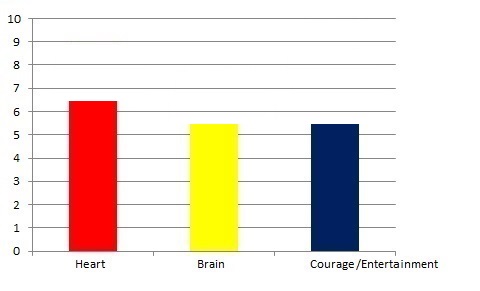 Hot Seat 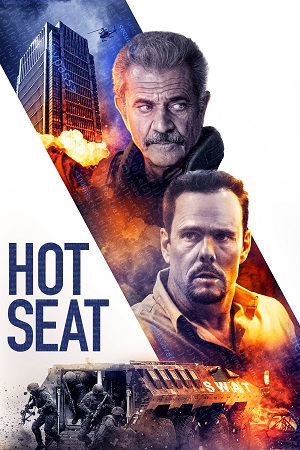 Orlando Friar (Kevin Dillon) works as an IT specialist at a call center with his co-worker, Enzo (Michael Welch), and is in the process of divorcing his wife, Kim (Lydia Hull). A hacker suddenly contacts him and lets him know that a bomb is strapped under his chair. He forces him to hack into a bond company online and steal digital currency, and threatens his daughter, Zoey (Anna Harr), while framing him as the bomber. A bomb squad, Wallace (Mel Gibson) and Jackson (Eddie Steeples) along with Chief Pam Connelly (Shannen Doherty), arrive to diffuse the situation as well as the bomb.
Hot Seat is based on a short story and probably should've stayed as one. The screenplay by Leon Langford and Collin Watts combines elements of Blown Away, Phone Booth, Speed, Saw and Arlington Road minus any thrills, suspense, intrigue and surprises. The hacker remains underseen much like the caller in Phone Booth, but once his identity becomes inevitably revealed, it's not even remotely shocking. Obviously, he has his reasons for choosing Orlando as his victim much like Jigsaw has reasons for choosing his. In this case, though, his reasons seem tacked-on like everything else in the lazy, inane screenplay. The plot becomes increasingly preposterous and contrived while asking the audience to suspend their disbelief too often. A little suspension of disbelief is okay, but there's a limit before the audience stops caring about anything that's happening. Even compared to Liam Neeson's recent set of dumb thrillers, Hot Seat comes up short and disappoints with not a single scene that's memorable or exciting. Practically every seen falls flat as the plot just goes through the motions until the even more contrived, over-the-top and implausible ending.
Everything from direction, editing, performances, action sequences and even the visual effects are all sub-par with no one standing out. Mel Gibson who's been in far better thrillers like Ransom and Lethal Weapon, among others, but here he just seems to be phoning it in. The filmmakers don't even get to bomb explosions right when it comes to visual effects and, especially, how some of the characters survives one of the bombs in a way that makes absolutely no logical sense. Sometimes lack of logic can be fine if there's still entertainment value, but Hot Seat doesn't even work as a guilty pleasure B-movie. At a running time of 1 hour and 39 minutes, it's an inert, inane and inept mess that doesn't work on any level. It makes Liam Neeson's lastest snoozefests seem like masterpieces. 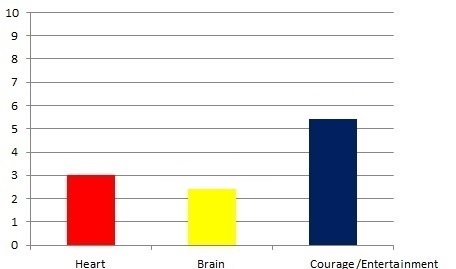 Minions: The Rise of Gru 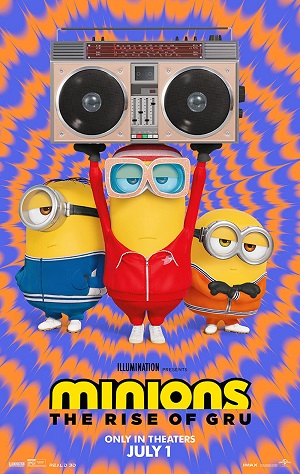 In 1970's, 11-year-old Gru (voice of Steve Carell) desperately wants to be a supervillain like Belle Bottom (voice of Taraji P. Henson), a member of the Vicious 6 who killed its founder, Wild Knuckles (voice of Alan Arkin), who stole a zodiac stone. Gru and his minion henchmen hatch a plan to steal the zodiac stone from the Vicious 6, but one of the minions, Otto, trades it for a pet rock from a kid. Minions: The Rise of Gru plays its premise too safely and conventionally without taking any risks or keeping the audience thoroughly engaged. Of course, the plot includes a MacGuffin, in this case, a zodiac stone. Why? Because it has to. To be fair, the plot doesn't really matter in a film like this nor does there need to be much suspense or anything brilliant; it's expected to be mindless fun that's funny, exciting, amusing and zany. The screenplay by Matthew Fogel just accomplishes just two of those elements: mindless and zany. The minions, with their gibberish that includes some Spanish words, are funny in Despicable Me and less so in Minions, but in this uninspired sequel, a villain "origin story", they eventually become as annoying and one-note as nails-on-a-chalk-board. The slapstick humor gets repetitive pretty quickly and becomes both silly as well as tiring. Some of the initial scenes as the audience is introduced to Gru at school are amusing and witty, i.e. when the teacher asks her students what they want to be when they grow up, one of them says that they want to be a teacher, and the teacher gives a witty quip--although she also invalidates the student's feelings concurrently. Of course, you know what Gru will say when it's his turn to give his answer to the teacher. That wittiness dissipates after the first 10 minutes. What takes its place is an action adventure that's neither thrilling, fun nor exciting. Megamind does the villain origin story better on all levels. The best aspect of Minions: The Rise of Gru is its 70's period detail that will at least keep adults mildly entertained. The use of 70's music, the clothing styles, the hair styles and some of the other details thrown in like a screening of Jaws that the minions go to are amusing. There's a bizarre choice of the song "You Can't Always Get What You Want" at a funeral scene that's an obvious throwback to The Big Chill, but that's not a 70's movie; it's an 80's movie. The terrific voice cast is also worth mentioning as well as the bright and colorful animation. However, the pacing moves so quickly as though it were a screwball comedy from the 1930's or made for audiences with ADHD. Fast paced zaniness could work in animated films like in the underrated A Town Called Panic, but that film has a much more funny and witty screenplay than this one. At a running time of just 1 hour and 19 minutes, Minions: The Rise of Gru is often dull, unfunny and exhausting while quickly running out of steam. Watch Marcel the Shell With Shoes On, Megamind or A Town Called Panic instead. 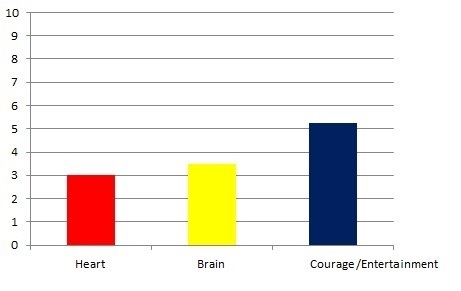 Rubikon 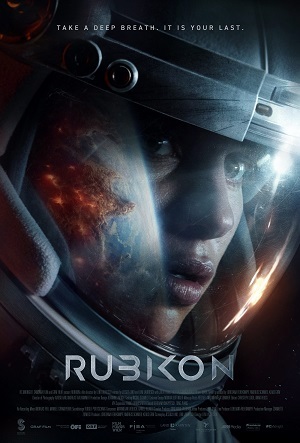 In the year 2056, Earth suffers from air pollution. Only the wealthy live in air domes with clean air while corporations have taken over the world. Two astronauts, Hannah (Julia Franz Richter) and Dr. Gavin (George Blagden), get sent to the Rubikon Space Station where Dr. Dimitri (Mark Ivanir) conducts experiments with algae. When a toxic fog envelops the Earth, they must choose between rescuing people down on Earth or staying in their space station. Imagine Gravity in a space station, but with waning suspense and you'll get an idea of what it's like to watch Rubikon. The screenplay by writer/director Magdalena Lauritsch and co-writer Jessica Lind has an interesting concept that sounds like it could be intriguing and gripping. In execution, though, the concept runs out of steam around the 30-minute mark with not enough "world building". The filmmakers leave too much to the audience's imagination, i.e. the tragic events that take place on Earth. We're supposed to care about the people left behind on Earth, but how can we care about them when the film stays in and around the Rubikon Space Station? This is the same issue that plagued last week's film, Olga, where much of the more compelling dramatic tension also remained sidelined along with the character associated with that important subplot. The scenes inside the space station fall flat when they should be exciting and riveting. Even when a twist involving the algae, which won't be spoiled here, isn't very surprising and doesn't generate much tension. It's not nearly as shocking as the twist in Event Horizon. There's also not nearly enough levity or comic relief to lighten the mood for a change, so the film quickly becomes monotonous. It's no help that none of the characters feel lived-on or memorable enough to connect with them on an emotional level. When someone dies, the poignant beat doesn't land, leaving the audience feeling cold and at an emotional distance from the characters. That said, the third act does take some risks with a dark, unHollywood ending. The underrated sci-fi film Silent Running does it better, though. On a purely aesthetic level, Rubikon at least has stunning CGI effects and set designs that add plenty of style. Visual spectacle alone isn't enough to hold the attention of audiences looking for a compelling narrative with interesting characters. The performances are decent, but there's not enough strong material for the actors to rise above it. Also, Rubikon overstays its welcome at a running time of 1 hour and 50 minutes. Gravity knows how to maintain tension while keeping the story lean in just around 90 minutes. The same can't be said for Rubikon. Ultimately, it's an underwhelming, cold and shallow sci-fi thriller that runs out of steam while lacking palpable thrills and suspense.
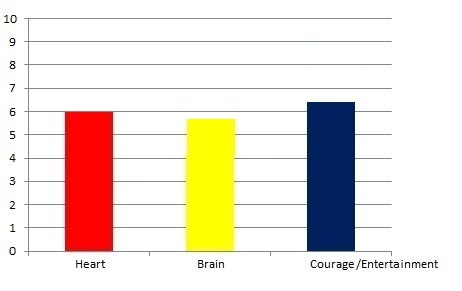 Sniper: The White Raven 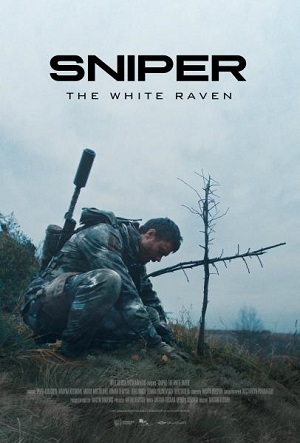 Mykola (Pavlo Aldoshyn) lives in a small Ukrainian town with his pregnant wife, Nastya (Maryna Koshkina), and works as a physics teacher at a local school. When Russian soldiers invade and kill his wife, Mykola renounces his pacifist way of life and seeks revenge for her death. He joins the military and gets trained to become a highly skilled sniper.
. Based on a true story, the screenplay by writer/director Marian Bushan and co-writer Mykola Voronin takes its time to let the audience get to know Mykola and his wife as human beings before delving to the meat of the story. Mykola and Nastya live a tranquil life together and you can feel their love for each other. His love of her is the driving force that compels him to join the army to avenge her death. What sounds like a shallow B-movie, like many of Liam Neeson's films for the past decades or like John WickSniper: The White Raven's greatest strength is that it remains grounded in realism and doesn't veer into unnecessary unplots. It's lean and focused, yet complex because of the wide ranges of emotions that Mykola goes through throughout the film. After his wife's death, he's not the same person that he was before. He's sad, angry and desperate for revenge. How he uses his emotions to fuel his decision to become a sniper instead of wallowing in sorrow is fascinating. It also means that he's not only strong physically, but emotionally, too. He's also very, very smart at least when it comes to math and physics which he displays in a training course in the military. Without voice-over narration, the audience is able to get inside Mykola's head to feel his rage for his wife's death as well as his love for her. Even the last scene, which could've ended with an action scene, ends on a tender, haunting, understated note that will linger in your heart, mind and soul long after the end credits roll. Pavlo Aldoshyn gives a convincingly moving performance as Mykola. He handles the emotional complexities of the role very effectively. Most importantly, he finds the emotional truth of Mykola and does a great job of opening the window into his inner life. The action sequences are gripping and intense without the use of shaky cam as a means of generating tension. Fortunately, there aren't too many action scenes; otherwise the film would've become loud and exhausting. This isn't a Michael Bay film, after all. There's even some lyricism in some of the images and details, i.e. the titular symbolism of the white raven. Poetry is almost always a form of protest. There's no doubt that this film is a protest against war and for love as well as peace. At a running time of 1 hour and 51 minutes, Sniper: The White RavenSniper: The White Raven is rousing, exhilarating and genuinely heartfelt.
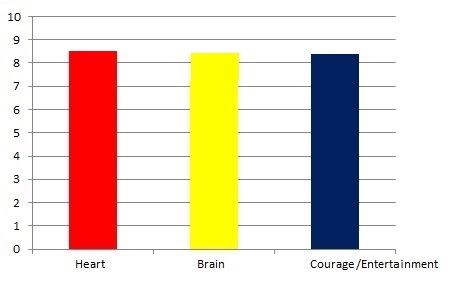 |